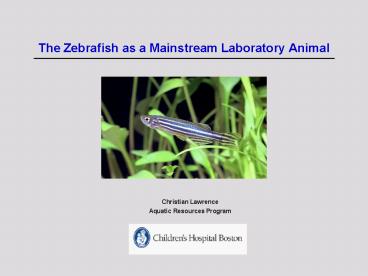The Zebrafish as a Mainstream Laboratory Animal - PowerPoint PPT Presentation
1 / 22
Title:
The Zebrafish as a Mainstream Laboratory Animal
Description:
Focus of laboratory animal science on mammalian species ... Laboratory Animal Science: 'Mammalian-Centric' ... Laboratory Animal Science: 'Mammalian-centric' ... – PowerPoint PPT presentation
Number of Views:157
Avg rating:3.0/5.0
Title: The Zebrafish as a Mainstream Laboratory Animal
1
The Zebrafish as a Mainstream Laboratory Animal
- Christian Lawrence
- Aquatic Resources Program
2
The Rise of Zebrafish
- Zebrafish have exploded in popularity as an
experimental model over the past fifteen years - This growth is expected to continue completion
of genome sequence, amenability to genetic drug
screening, in-vivo analysis, etc. - Viable complement and alternative to rodents
ZEBRAFISH INTEGRATON
3
Annual Number of Publications (Zebrafish)
ZEBRAFISH INTEGRATON
4
Annual Number of Publications (Mouse)
ZEBRAFISH INTEGRATON
5
Percent Change in Number of Publications
(Selected Major Model Organisms)
ZEBRAFISH INTEGRATON
6
Zebrafish Here to Stay
- Zebrafish are now a part of the animal program at
most research institutions. - Large core facilities are increasingly common in
expansion plans. - Zebrafish can be considered a mainstream
laboratory animal.
www.zebrafishmed.utah.edu
ZEBRAFISH INTEGRATON
7
Mainstream in Use Only
- The rigorous standards in place in the U.S. to
regulate the care and use of mainstream
laboratory animals do not adequately address the
use of zebrafish. - The result?
- Zebrafish are not being maintained at the same
level and to the same standard as their mammalian
counterparts.
ZEBRAFISH INTEGRATON
8
Why are Zebrafish On the Outside Looking In?
- Four primary factors underlying the current
situation of zebrafish care and use in the U.S. - History (with respect to who developed field)
- Focus of laboratory animal science on mammalian
species - Regulations and the Guide dont adequately
address fish - Innate qualities of zebrafish themselves
ZEBRAFISH INTEGRATON
9
Historical Aspects
- Mainstream use of zebrafish as an experimental
model was pioneered by developmental
neurobiologists at the University of Oregon in
the 1980s. - Genetic Screens
- Brilliant scientists? Unequivocally, yes. But
fish biologists? No. - Past, present, and future users of zebrafish are
not necessarily - (and in most cases are not) experts in their
biology and care.
ZEBRAFISH INTEGRATON
10
Historical Aspects
- Science of zebrafish husbandry very poorly
developed - Voodoo instead of biologically based protocols
ZEBRAFISH INTEGRATON
11
Laboratory Animal Science Mammalian-Centric
- Expertise of lab animal professionals is
primarily in mammalian biology, medicine, and
husbandry - Responsible for administering animal resource
programs - Orchestrating, overseeing, and participating in
regulatory functions (animal use guidelines,
facility inspections, animal use protocol review,
etc.) - Training laboratory animal care and research
personnel - Caring for animals
ZEBRAFISH INTEGRATON
12
Laboratory Animal Science Mammalian-centric
AALAS National Meeting Platform Sessions and
Posters
ZEBRAFISH INTEGRATON
13
Existing Regulatory Guidelines
- Two primary regulations governing use of
laboratory animals - Animal Welfare Act (AWA) Fishes are not covered
- U.S. Public Health Service (PHS) Policy on Humane
Care and Use of Laboratory Animals Fishes are
covered - the PHS Policy is intentionally broad in scope
and does not prescribe specifics about the care
and use of any species, assigning the task to
IACUCs and allowing for professional judgment"
(Potkay et al. 1997)
ZEBRAFISH INTEGRATON
14
Existing Regulatory Guidelines
- The Guide to the Care and Use of Laboratory
Animals is the primary reference for animal
research adopted by PHS policy - Contains minimal information relative to fishes
ZEBRAFISH INTEGRATON
15
Zebrafish are Tough
- Zebrafish are easy to culture
- Situation capitalized on by fish hobbyists and
scientists - Makes it difficult to identify problems
Photo courtesy of R. Spence
ZEBRAFISH INTEGRATON
16
Where is the Oversight?
- The four aforementioned factors tend to promote
substandard care and management. - Various levels of control and oversight built
into the system should prevent this from
happening. - Soif there are problems in a zebrafish program,
who detects - and corrects - them?
ZEBRAFISH INTEGRATON
17
IACUCs?
- In many cases (especially biomedical research
institutions), IACUC committees do not have
requisite expertise in fishes. - Must rely on regulatory guidelines to inform
decisions - Ad-hoc consultants can be utilized
- The ability of IACUC to positively influence a
zebrafish program may be limited
ZEBRAFISH INTEGRATON
18
Animal Resources Departments?
- Institutional animal resources departments are
formally responsible for management and care of
zebrafish. - Typical situation in such departments is that
no one has necessary expertise (via formal
training and/or hands on experience). - Animal resources departments include zebrafish,
but often do not directly manage them as they do
other lab animal species. - In such situations, operational responsibility
for zebrafish management is shunted to
investigators. - Technically responsible party is disconnected
from management of the animals
ZEBRAFISH INTEGRATON
19
Accrediting Bodies?
- AAALAC International
- Do council members and ad-hoc consultants really
know fish? - Some do, some dont.
- When then answer is no, utility of such
oversight for zebrafish programs is limited - Focus on non-relevant issues, opportunities to
correct real problems missed
ZEBRAFISH INTEGRATON
20
Investigators Using Zebrafish?
- In most cases, investigators do not possess
adequate formal training in disciplines of fish
biology/husbandry. - Experts in using fish to study particular system,
but not in zebrafish themselves - Keeping zebrafish alive (or breeding) is not
necessarily indicative of expertise - Intrinsic conflict of interest can be problematic
- Complete reliance on investigators to run
zebrafish facilities is a flawed strategy
ZEBRAFISH INTEGRATON
21
The Reality Oversight is Typically Inadequate
- In many cases, investigators using zebrafish are
the primary arbiters of care and use of the fish.
- Who oversees investigators?
- IACUC?
- Animal Resources?
- AAALAC?
ZEBRAFISH INTEGRATON
22
The Way Forward
- How can this problem be solved?
- The following presentations will illustrate how 5
different institutions are meeting these
challenges
ZEBRAFISH INTEGRATON































